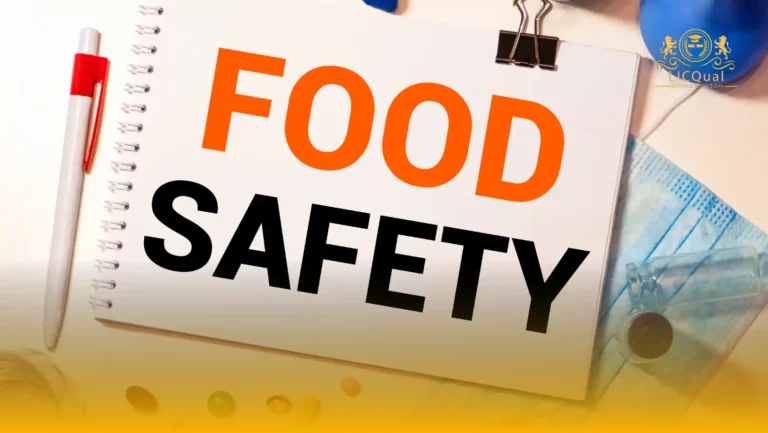The LICQual Level 6 Diploma in Food Science and Nutrition (Dip Food Science and Nutrition) is an advanced qualification designed for professionals seeking in-depth knowledge and expertise in the science of food and its impact on human health. This diploma equips learners with the skills to analyse food composition, evaluate nutritional quality, and apply scientific principles to promote health and wellbeing across diverse populations.
This qualification is ideal for nutritionists, dietitians, food scientists, healthcare practitioners, and allied health professionals who wish to enhance their career prospects, expand their professional knowledge, and meet Continuing Professional Development (CPD) requirements. Learners will gain expertise in areas such as food chemistry, microbiology, nutrient metabolism, functional foods, and the role of diet in health promotion and disease prevention. The programme emphasises integrating scientific theory with practical application, enabling learners to apply evidence-based approaches in research, policy, and professional practice.
Centres delivering the Level 6 Diploma in Food Science and Nutrition are required to uphold the highest standards of education. This includes employing competent and qualified staff, providing access to all necessary learning materials and resources, and creating a supportive learning environment that ensures learner success. Structured teaching, practical exercises, and rigorous assessments equip learners with the confidence and competence required to excel in the field of food science and nutrition.
By completing the LICQual Level 6 Diploma in Food Science and Nutrition, learners not only enhance their professional knowledge and practical skills but also demonstrate a commitment to ongoing professional development, preparing them for advanced roles in research, healthcare, food industry, and public health nutrition sectors.
Course Overview
Qualification Title
LICQual Level 6 Diploma in Food Science and Nutrition (Dip Food Science and Nutrition)
Total Units
6
Total Credits
120
GLH
480
Qualification #
LICQ2201070
Qualification Specification
To enroll in the LICQual Level 6 Diploma in Food Science and Nutrition (Dip Food Science and Nutrition), applicants must meet the following criteria:
|
Qualification# |
Unit Title |
Credits |
GLH |
|---|---|---|---|
|
LICQ2201070-1 |
Principles of Food Science |
20 |
80 |
|
LICQ2201070-2 |
Nutritional Biochemistry and Physiology |
20 |
80 |
|
LICQ2201070-3 |
Food Analysis and Laboratory Techniques |
20 |
80 |
|
LICQ2201070-4 |
Functional Foods and Nutraceuticals |
20 |
80 |
|
LICQ2201070-5 |
Food Safety, Quality, and Regulation |
20 |
80 |
|
LICQ2201070-6 |
Research, Evidence-Based Practice, and Professional Development |
20 |
80 |
By the end of this course, learners will be able to:
Unit 1: Principles of Food Science
By the end of this unit, the learner will be able to:
- Explain the fundamental principles of food science and its relevance to nutrition
- Analyse the chemical, physical, and microbiological properties of food
- Evaluate factors affecting food quality, safety, and shelf-life
- Apply food science concepts to practical and professional contexts
Unit 2: Nutritional Biochemistry and Physiology
By the end of this unit, the learner will be able to:
- Describe the structure, function, and metabolism of macronutrients and micronutrients
- Analyse the role of nutrients in maintaining health and preventing disease
- Assess physiological and biochemical responses to dietary intake
- Apply biochemical knowledge to support nutrition-related decisions
Unit 3: Food Analysis and Laboratory Techniques
By the end of this unit, the learner will be able to:
- Demonstrate laboratory techniques for analysing food composition
- Interpret analytical results for nutritional evaluation
- Ensure accuracy, reliability, and safety in laboratory practice
- Apply analytical findings to support evidence-based nutrition interventions
Unit 4: Functional Foods and Nutraceuticals
By the end of this unit, the learner will be able to:
- Explain the concepts and classification of functional foods and nutraceuticals
- Evaluate the bioactive compounds and their health benefits
- Critically appraise scientific evidence supporting functional food claims
- Apply knowledge of functional foods in diet planning and public health nutrition
Unit 5: Food Safety, Quality, and Regulation
By the end of this unit, the learner will be able to:
- Explain principles of food hygiene, safety, and quality assurance
- Analyse national and international food legislation and regulatory frameworks
- Apply Hazard Analysis and Critical Control Points (HACCP) principles in practice
- Evaluate compliance strategies to meet food safety and quality standards
Unit 6: Research, Evidence-Based Practice, and Professional Development
By the end of this unit, the learner will be able to:
- Apply research methodologies relevant to food science and nutrition
- Critically evaluate scientific literature to inform professional practice
- Implement evidence-based approaches in food science and nutrition interventions
- Plan and engage in Continuing Professional Development (CPD) to enhance career progression
The LICQual Level 6 Diploma in Food Science and Nutrition is designed for individuals who want to build advanced knowledge, practical skills, and professional credibility in the food and nutrition sector. This qualification is ideal for learners seeking career growth, international recognition, or progression into higher education within food science and nutrition.
Aspiring Food Science Professionals
- Individuals aiming to start or advance a career in food science and nutrition
- Learners seeking a recognized Level 6 food science qualification
- Those interested in food quality, food safety, and nutritional science
- Professionals looking to enter the global food industry
- Individuals planning to work in food production or processing roles
Nutrition and Health Practitioners
- Nutrition assistants seeking formal professional recognition
- Health professionals expanding knowledge in food science and nutrition
- Individuals working in community nutrition or wellness programs
- Those interested in diet, health, and disease prevention
- Professionals supporting nutrition-based health initiatives
Food Industry and Quality Assurance Professionals
- Employees working in food manufacturing and processing units
- Quality control and food safety officers
- Professionals involved in food inspection and compliance
- Individuals responsible for maintaining food quality standards
- Staff aiming to progress into supervisory or management roles
Healthcare and Allied Health Professionals
Healthcare workers seeking nutrition-focused qualifications
- Laboratory technicians involved in food or health testing
- Professionals supporting clinical nutrition and dietary services
- Individuals working in hospitals, clinics, or health organizations
- Those aiming to strengthen food safety and nutrition knowledge
Career Changers and Professional Upskillers
- Individuals transitioning into food science and nutrition careers
- Professionals seeking a food science diploma for career advancement
- Learners wanting globally recognized nutrition qualifications
- Individuals returning to education after a career break
- Those aiming to improve employability in international markets
International and Online Learners
- International students seeking a UK Level 6 food science diploma
- Learners looking for flexible, online food science education
- Professionals balancing work and study commitments
- Students aiming for qualifications accepted worldwide
Learners Planning Academic Progression
- Students preparing for higher-level studies in food science or nutrition
- Individuals planning to progress to Level 7 or degree programs
- Learners building strong academic foundations in nutrition science
- Professionals seeking qualifications aligned with global standards
- Individuals aiming for long-term growth in food and health sectors
To deliver the LICQual Level 6 Diploma in Food Science and Nutrition (Dip Food Science and Nutrition) effectively, centres must meet the following requirements to ensure high-quality training and learner success:
- Qualified and Competent Staff: All teaching and assessment staff must hold relevant qualifications in food science, nutrition, dietetics, or related healthcare and scientific fields, with substantial professional experience. Staff should be capable of delivering Level 6 curriculum content and supporting learners in achieving their learning outcomes.
- Comprehensive Learning Resources: Centres must provide learners with access to essential learning materials, including textbooks, research journals, laboratory equipment, analytical tools, online databases, and relevant technology to support practical exercises, research, and assessments.
- Facilities and Equipment: Centres should have classrooms, laboratories, and practical spaces suitable for interactive learning, laboratory work, and workshops. Access to IT resources, computers, and reliable internet connectivity is essential.
- Assessment and Quality Assurance: Centres must implement robust assessment procedures aligned with Level 6 standards, ensuring assessments are valid, reliable, and fair. Quality assurance processes should monitor teaching effectiveness and learner progress.
- Learner Support: Centres should provide guidance on study skills, access to tutors, and advice on professional development opportunities to support learners throughout the programme.
- Commitment to Continuing Professional Development (CPD): Centres must encourage CPD for both staff and learners, promoting ongoing skill development and career progression.
- Regulatory Compliance: Centres must adhere to all relevant health, safety, and educational regulations, ensuring a safe, professional, and conducive learning environment.
Meeting these requirements ensures learners receive high-quality education, develop advanced competencies in food science and nutrition, and achieve their full potential in research, public health, and professional practice.
Assessment and Verification
All units within this qualification are subject to internal assessment by the approved centre and external verification by LICQual. The qualification follows a criterion-referenced assessment approach, ensuring that learners meet all specified learning outcomes.
To achieve a ‘Pass’ in any unit, learners must provide valid, sufficient, and authentic evidence demonstrating their attainment of all learning outcomes and compliance with the prescribed assessment criteria. The Assessor is responsible for evaluating the evidence and determining whether the learner has successfully met the required standards.
Assessors must maintain a clear and comprehensive audit trail, documenting the basis for their assessment decisions to ensure transparency, consistency, and compliance with quality assurance requirements.







